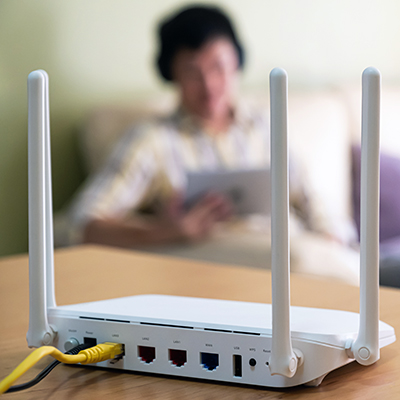
Interestingly, WiFi began with aloha, as University of Hawaii scientists used ALOHANET to transmit the first wireless data packets sent without the use of connected cables or satellites. Then, in 1999, Vic Hayes (the “father of Wi-Fi”) created the updated 802.11b WiFi standard and this technology flowed from colleges and universities into our homes.
Home WiFi networks made it amazingly easy to wirelessly connect multiple devices, from computers and tablets to smartphones and gaming systems, to the Internet and set the stage for the future smart home.
Challenges of WiFi in the Home
While home Wi-Fi is a great plus in our lives, there are still some issues that can cause problems at times. If you work from home full or part time, any WiFi problems can also cause major interruptions in your business day.
You may not be able to get a strong and reliable WiFi signal, or maybe your download or video playback speed are incredibly slow sometimes. In certain places within your home, the signal may be weak or blocked. If you have an older router, your settings may also be outdated and you might even be running a Wi-Fi network that is not secure.
Need for Smart Routers and Mesh Networks
The traditional router basically functions as a hub, offering wireless Internet connections to the devices in your home. The proliferation of additional devices, coupled with the rise in remote and hybrid working, have placed additional demands on home Wi-Fi networks.
Instead of running a traditional router, you could upgrade to either a smart router or a mesh WiFi network. A smart router is designed to scan frequencies and automatically assure that an uninterrupted connection is available to support your connected devices and smart home nodes too. Mesh networks provide excellent coverage, and offer both speed and improved connection reliability throughout your home.
Understanding Smart Routers
Smart WiFi routers provide the performance boost and reliability you need to fully accommodate your web surfing and streaming connections, work from home requirements and smart home devices. They can automatically scan available frequencies and assure a quality connection, and provide improved interaction with all of your applications and mobile devices.
A smart home router also provides software and tools that give you greater control over users and Internet content. You can add parental controls, map out who has network access and who doesn’t and receive alerts if someone accesses restricted content. These routers offer improved network security, and include up to 13 antennas so signal broadcast coverage is improved.

Comparison With Traditional Routers
In the past, home computer systems blocked many attacks by relying on antivirus software and the like. Unfortunately, the introduction of multiple smart home devices with far less robust security opened up our homes to attack. With smart routers, you get improved, robust network defences that help keep your home Internet environment safe.
Smart routers also use multiple antenna to help improve signal strength and coverage within your home. Instead of the traditional one or two antenna, they use up to thirteen and broadcast in a circular pattern to overcome dead points and provide better coverage.
Understanding Mesh Networks
Mesh networks, also called Whole Home WiFi, give you full house coverage by taking a decentralised approach to connectivity. Instead of having all of your devices connect to a single-point router, mesh systems offer multiple Wi-Fi nodes placed throughout your home. One node serves as the primary router, while the other mesh devices function as satellites; together, they create a seamless, single network.
Mesh network nodes are designed to look nice, and complement the decor of your home. They provide greater coverage and improved WiFi reliability and availability within your home. Mesh systems are easy to set up, and include software or apps that support parental controls and cyber security scanning. They offer high performance handling of multiple devices, and they’ll even switch you automatically to a node with a stronger signal if that helps.

Traditional vs. Mesh Networks
The primary difference between traditional router systems and mesh networks is that the former are centralised, while the mesh systems are decentralized. With a traditional router setup, all of the traffic from all of the connected devices in your home has to go through a single access point.
Mesh systems boost wifi signal by giving you scalable, distributed coverage throughout your home. They provide multiple access points and can route your device to the strongest signal connection within the mesh network.
Choosing the Right Smart Router or Mesh Network
One of the first things you should consider when evaluating options between smart routers and mesh networks is the square footage within your home. After calculating the square footage, compare it to the square footage coverage specified by your top smart router choices.
If you have a bigger home, or thick walls and insulation, you may find that a single router will leave you with dead spots or areas where the WiFi signal is compromised. In this case, selecting a mesh network would be the right choice. Look for a top-rated mesh network product that offers easy setup via their app, customisable controls and has a nice design aesthetic so the multiple nodes look good in your home.
Popular Brands and Models
If your family has a lot of tablets, phones and other devices, then the Asus RT-AX86U dual-band Wi-Fi 6 router might be a good choice. It is a powerhouse, and also offers built in security features and protections. For a family with dedicated gamers, the TP-Link Archer GX90 Smart Home Router would be wonderful option. This Wi-Fi 6 router offer three bands and is optimised for gaming performance and supports gaming safety protocols.
For a mesh network that offers top speed WiFi for every device and in every room, consider StellarWiFi. This is a TrueMesh system that lets you move seamlessly from room to room while enjoying optimised performance, with no dead spots. You can add it for a small charge per month, and it’s free with Melita’s Flexi Internet Fibre Power 1,000 Mbps.
Setting Up a Smart Router or Mesh Network
Each router has its own unique setup instructions and procedure. If you happen to be using a Linksys Smart WiFi router, you’ll use their smart setup wizard. Plug in any external antennas, and then plug the router into power and turn it on. You then connect the Ethernet cable from your modem to the router’s internet port. From there, connect to your secured WiFi and launch smart setup in your web browser.
With a mesh network, you’ll want to locate the primary node in the centre of the house and fill in the edges of coverage with the satellite nodes. You then download the mesh network’s app to your phone. The next steps are to unplug your existing router and connect the main node via an Ethernet cable, then reconnect the router and power it up. You’ll then be prompted for the main node name and the number of satellite nodes.
![[eero-PoE-6]-Install-5](https://www.melita.com/wp-content/uploads/2023/05/eero-PoE-6-Install-5.jpg)
Conclusion
With the rise in popularity of home screens and devices, remote working and smart appliances and devices, setting up reliable home WiFi has become a challenge. Rather than dealing with the limitations of traditional routers, you can take advantage of more powerful technologies and upgrade to either a smart home router or mesh network.
Smart routers will give you the added security you need to protect your family and smart appliances and devices, and will let you easily manage your users too. For seamless WiFi coverage throughout your home, choosing a mesh network is the best choice.






